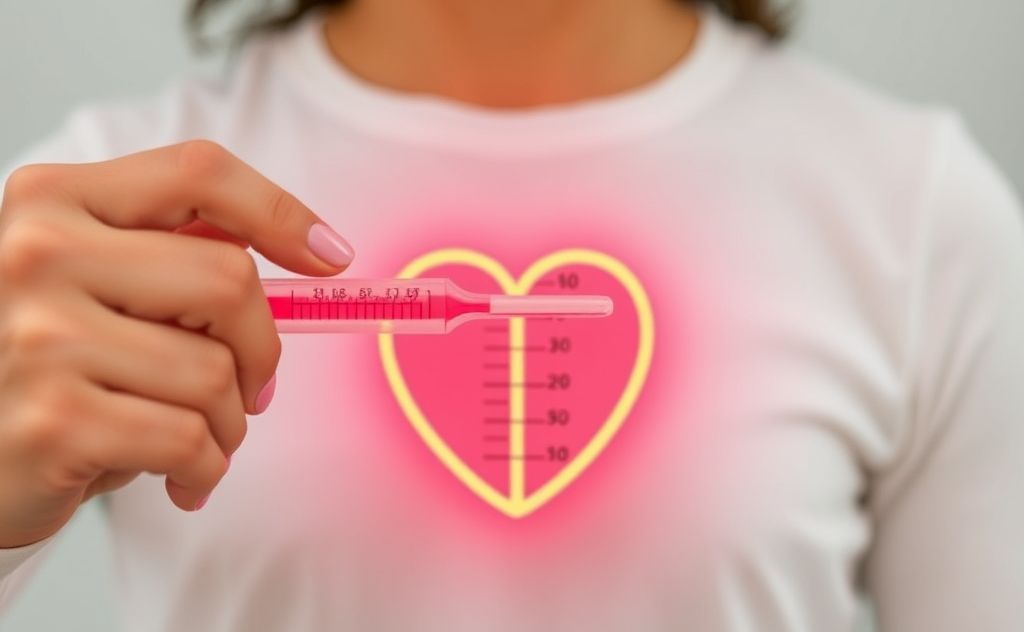Temperature affects heart health by influencing blood pressure, heart rate, and vascular function, with extreme heat or cold posing risks for cardiovascular events.
Both extreme heat and cold can significantly impact cardiovascular health. Temperature fluctuations force your heart to work harder, increasing risks for people with existing conditions. Understanding these effects helps you protect your heart year-round.

How Heat Strains Your Cardiovascular System
When temperatures rise, your body activates cooling mechanisms that directly affect heart function:
Blood Flow Redistribution
Your body redirects up to 50% more blood to the skin’s surface for cooling. This forces your heart to pump harder and faster – sometimes circulating 2-4 times more blood per minute than normal.
Dehydration Risks
Sweating causes fluid loss that reduces blood volume. Even mild dehydration (1-2% body weight) makes your heart work harder. Severe cases can lead to dangerous electrolyte imbalances.
Medication Interactions
Common heart medications can impair temperature regulation:
- Beta blockers limit heart rate increases
- Diuretics promote fluid loss
- Calcium channel blockers affect blood vessel dilation

Cold Weather’s Impact on Heart Health
Winter brings different cardiovascular challenges:
Blood Pressure Spikes
Cold causes blood vessels to constrict, increasing blood pressure by 10-20 mmHg. This sudden change can trigger heart attacks in vulnerable individuals.
Increased Clotting Risk
Lower temperatures make blood more viscous. Combined with higher blood pressure, this raises stroke and heart attack risks.
Physical Stress
Shoveling snow or other cold-weather activities dramatically increase cardiac workload. The American Heart Association reports snow shoveling doubles heart attack risk in men.
Who’s Most Vulnerable?
| Risk Group | Heat Concerns | Cold Concerns |
|---|---|---|
| Heart Disease Patients | Medication interactions, fluid balance | Blood pressure spikes, angina |
| Hypertension | Dehydration effects | Vasoconstriction dangers |
| Seniors (65+) | Reduced sweating ability | Poor temperature perception |
Protective Measures for All Seasons
Heat Safety Strategies
- Hydrate with 8oz water every 20 minutes outdoors
- Wear light, breathable fabrics like those in modern heater designs
- Schedule activities for cooler morning/evening hours
Cold Weather Precautions
- Layer clothing to maintain core temperature
- Warm up gradually before physical activity
- Consider indoor heating alternatives for vulnerable individuals
When to Seek Medical Help
Recognize these warning signs of temperature-related distress:
Heat Emergencies
- Confusion or dizziness
- Nausea/vomiting
- Rapid, weak pulse
Cold Emergencies
- Chest pain or pressure
- Slurred speech
- Extreme fatigue
Research from the Harvard Medical School shows cardiovascular deaths increase 18% during heat waves. Meanwhile, a Mayo Clinic study found cold weather accounts for 53% more heart attacks than optimal weather conditions.
Medication Management
Many common prescriptions require special attention during temperature extremes:
Heat Considerations
Diuretics may require dosage adjustments to prevent dehydration. Beta blockers can mask heat stress symptoms.
Cold Considerations
Blood thinners may need monitoring as cold affects viscosity. Nitrates for angina become more crucial in winter.
Always consult your doctor about seasonal medication adjustments. Proper storage matters too – extreme temperatures can degrade medications just like they stress your heart.
